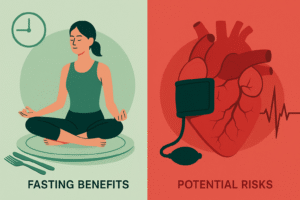Fun Fact: Did you know that even when you’re sleeping, your body is constantly burning calories? This process, called basal metabolic rate, is essential for keeping your body functioning while at rest!
When we think about energy, we often imagine power plants or batteries, but the most amazing energy system is right inside our own bodies. This system is responsible for converting the food we eat into the energy we need to move, think, and live. This fascinating process is known as metabolism, and its balance is what keeps us feeling active—or sluggish—throughout the day. In this blog, we’ll explore the science of human metabolism and energy balance, breaking down complex processes into easy-to-understand concepts. By the end, you’ll have a deeper appreciation for the remarkable way your body turns food into fuel.
What is Metabolism?
Metabolism refers to the set of chemical reactions that convert the food and beverages you consume into usable energy for your body. It’s a continuous process that happens even when you’re sitting, sleeping, or watching your favourite Netflix show. To keep the heart beating, lungs breathing, and brain thinking, your body uses energy even when you’re at rest. The energy produced during metabolism comes from the calories in your food and beverages, which are transformed into the fuel your body needs to function.
There are two types of metabolism:
- Anabolism: This is the building-up process. It’s where small molecules come together to create larger ones, helping with the growth, repair, and storage of energy.
- Catabolism: This is the breaking-down process. It’s where large molecules, such as carbohydrates and fats, are broken down into smaller units to release energy.
Both processes work hand-in-hand, allowing your body to efficiently manage energy.

The Role of Basal Metabolic Rate (BMR)
Your Basal Metabolic Rate (BMR) is the number of calories your body needs to maintain basic functions—like breathing, circulation, and cell production—while at rest. This makes up a large portion of the energy you expend each day, roughly 60-75% for most people. Think of your BMR as the energy your body needs just to stay alive, even if you’re lying in bed all day.
The BMR is influenced by several factors:
Age: As we age, the efficiency of our metabolism tends to decrease.
Gender: Men generally have a higher BMR because they tend to have more muscle mass.
Body Composition: Muscle burns more calories than fat, so the more muscle you have, the higher your BMR.
Genetics: Some individuals inherit a naturally faster metabolic rate due to their genetic makeup.
Calories: The Body’s Energy Currency
We often hear about “calories in, calories out,” but what does that really mean? A calorie is simply a unit of energy. When we consume food, we’re essentially fueling our bodies with energy, which can be stored for later use or burned off immediately.
The key to energy balance is maintaining a healthy ratio between the calories consumed and the calories burned. If you consume more calories than your body needs, the excess is stored as fat. When you expend more calories than you consume, your body taps into stored fat for energy, which leads to weight loss.
Case Study: The Impact of Caloric Imbalance
Consider the case of Rahul, a 35-year-old office worker who noticed he was gaining weight despite not significantly changing his diet. Upon reviewing his activity levels, it became clear that working from home had decreased his daily movement, lowering the number of calories he burned. Rahul started a 30-minute daily walking routine and saw his weight stabilize over time. This case shows how even small changes in activity can affect energy balance.
The Role of Macronutrients
Not all calories are created equal. Our bodies derive energy from three primary macronutrients:
Carbohydrates: These are the body’s preferred source of energy. They break down into glucose, which fuels everything from your brain to your muscles.
Proteins: Although proteins are mainly involved in tissue building and repair, they can also act as an alternative energy source when carbohydrates and fats are in short supply.
Fats: Often misunderstood, fats are crucial for storing energy and supporting cell function. Beneficial fats, such as those present in avocados and nuts, are crucial for maintaining long-term energy balance.
Each of these macronutrients has a different caloric value:
Carbohydrates and proteins: 4 calories per gram.
Fats: 9 calories per gram.
Understanding these values helps you make informed choices about what fuels your body best.
Factors Influencing Metabolism
Physical Activity: The more you move, the more energy your body requires. Whether you’re walking, lifting weights, or dancing, your metabolism ramps up to fuel your muscles.
Thermic Effect of Food (TEF): Did you know that digesting food also burns calories? This is called the thermic effect of food. Proteins require the most energy to digest, which is why diets high in protein are often suggested for weight management.
Hormones: Hormones, such as insulin, which controls blood sugar, and thyroid hormones, which regulate metabolic speed, also impact how metabolism functions.
Sleep: Lack of sleep can significantly affect metabolism. Research has found that people who are sleep-deprived tend to experience slower metabolic rates, potentially leading to weight gain.
Energy Imbalance and Its Effects
An imbalance in your energy levels can lead to a variety of health issues. If you consistently eat more calories than your body burns, it contributes to weight gain, increasing the likelihood of developing conditions like type 2 diabetes and heart disease. On the flip side, consuming too few calories can cause nutrient deficiencies, muscle deterioration, and a sluggish metabolism.
Conclusion
The study of human metabolism and energy balance is intriguing and plays a vital role in how our bodies function and how we feel daily. By gaining insight into your body’s energy requirements, making thoughtful food choices, and staying physically active, you can maintain an energy balance that supports both immediate vitality and long-term health.
Call to Action: Start paying attention to how your body responds to food and activity. Are there areas where you can improve your energy balance? Small changes can lead to big results!
Author’s Note:
Understanding metabolism is key to making informed decisions about your health. I hope this blog helped clarify how our bodies manage energy and offered practical tips to enhance your energy balance.
G.C., Ecosociosphere contributor.




